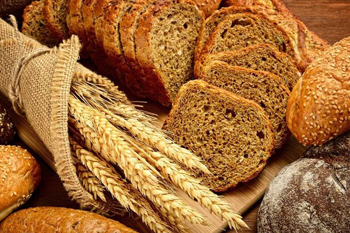
6. Less Wheat Protein in Our Diet May Increase the Risk of Type 2 Diabetes |

![]() New research - presented at the American Heart Association's Epidemiology and Prevention/Lifestyle 2017 Scientific Sessions - suggests that a low-gluten diet may have adverse health effects by raising the risk of type 2 diabetes.
New research - presented at the American Heart Association's Epidemiology and Prevention/Lifestyle 2017 Scientific Sessions - suggests that a low-gluten diet may have adverse health effects by raising the risk of type 2 diabetes.
![]() Gluten is a protein mainly found in wheat, barley, and rye, as well as baked goods and other foods that contain these cereals.
Gluten is a protein mainly found in wheat, barley, and rye, as well as baked goods and other foods that contain these cereals.
![]() The team approximated the gluten consumption for 199, 794 individuals enrolled in three long-term studies: the Nurses' Health Study (NHS) I and II, and the Health Professionals Follow-up Study (HPFS).
The team approximated the gluten consumption for 199, 794 individuals enrolled in three long-term studies: the Nurses' Health Study (NHS) I and II, and the Health Professionals Follow-up Study (HPFS).
![]() As part of these studies, participants answered food frequency questionnaires every 2 to 4 years. Overall, participants consumed under 12 grams of gluten per day. The average daily consumption was 5.8 grams for the NHS I study, 6.8 grams for NHS II, and 7.1 grams for HPFS.
Researchers followed the participants for approximately 30 years, between 1984-1990 and 2010-2013.
As part of these studies, participants answered food frequency questionnaires every 2 to 4 years. Overall, participants consumed under 12 grams of gluten per day. The average daily consumption was 5.8 grams for the NHS I study, 6.8 grams for NHS II, and 7.1 grams for HPFS.
Researchers followed the participants for approximately 30 years, between 1984-1990 and 2010-2013.
![]() Throughout the 30-year follow-up period, 15,947 cases of type 2 diabetes were identified.
The study found that participants who had the highest gluten intake - up to 12 grams per day - had a lower risk of developing type 2 diabetes over the 30-year follow-up period. Those who ate less gluten also had a lower cereal fiber intake. Fiber is known to protect against type 2 diabetes.
Throughout the 30-year follow-up period, 15,947 cases of type 2 diabetes were identified.
The study found that participants who had the highest gluten intake - up to 12 grams per day - had a lower risk of developing type 2 diabetes over the 30-year follow-up period. Those who ate less gluten also had a lower cereal fiber intake. Fiber is known to protect against type 2 diabetes.
![]() After adjusting for the protective effect of fiber, participants in the upper 20 percent on the gluten consumption scale were 13 percent less likely to develop type 2 diabetes, compared with those on the opposite end of the scale - namely, those whose gluten intake was below 4 grams per day.
After adjusting for the protective effect of fiber, participants in the upper 20 percent on the gluten consumption scale were 13 percent less likely to develop type 2 diabetes, compared with those on the opposite end of the scale - namely, those whose gluten intake was below 4 grams per day.
![]() Limitations of the study include its observational nature, which means that it cannot establish causality, and the fact that more research is needed to confirm the findings. Additionally, the researchers did not include data from those who have eliminated gluten from their diet completely.
Limitations of the study include its observational nature, which means that it cannot establish causality, and the fact that more research is needed to confirm the findings. Additionally, the researchers did not include data from those who have eliminated gluten from their diet completely.
For enquiries info@jothydev.net.
Please visit: jothydev.net | research.jothydev.com | diabscreenkerala.net | jothydev.com/newsletter
